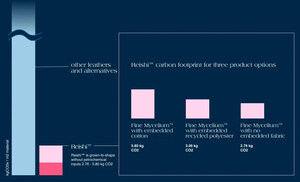
SAN FRANCISCO, May 19, 2020 /PRNewswire/ -- MycoWorks, the mycelium biomaterials company that produces Reishi™, a non-animal, non-plastic option for fine leather, today announced the formation of its Scientific Advisory Board (SAB). The SAB assembles five esteemed scientists who are leaders in the field of mushroom science and research (mycology), to guide the advancement of MycoWorks' current and future mycelium materials.
MycoWorks Co-Founder and CTO Philip Ross spearheaded the recruitment of the SAB, seeking leading experts in the molecular and genomic characterization of mycelium growth characteristics, bioinformatics and optimization of protein and metabolite formation. Initially, the SAB will advise on efforts to develop a custom Reishi strain with enhanced mechanical properties, custom surface qualities and a faster growth cycle. Long-term endeavors will apply MycoWorks' process to create new materials for industrial applications beyond the current use of Reishi Fine Mycelium™ for fashion and footwear.
Chaired by Philip Ross, the SAB will draw upon each member's expertise to address the future of MycoWorks' materials research and development. "We are excited to have joined with these distinguished researchers who offer the world's most advanced insights into mycelium technology," MycoWorks' CEO Matt Scullin said. "The SAB provides research partnerships with world class institutions and the resources to accelerate our breakthroughs in product and process development."
The MycoWorks SAB is comprised of the following members:
Chair, Philip Ross, Artist and MycoWorks Co-Founder and CTO, whose internationally awarded and exhibited research is focused on biomaterial design and life support technologies. Mr. Ross's innovations in mycelium engineering are globally recognized as foundational to the invention of mycotecture, the practice of building and designing with mycelium.
Leopoldo Naranjo Briceño, Ph.D., Professor and Researcher in Molecular Biology and Biotechnology at the Universidad Regional Amazónica Ikiam, Co-Director of the Applied Microbiology Group, and Head of the Microbial Biotechnology Lab. Dr. Briceño's research has focused on the rational use of microbial and genetic biodiversity for environmentally sustainable biotechnological products with applications in human health, agriculture and the energy sector. Currently, Dr. Naranjo is designing and developing new tools for genome engineering of filamentous fungi using the CRISPR/Cas system.
N. Louise Glass, Ph.D., Director of Environmental Genomics and Systems Biology Division at the Lawrence Berkeley National Laboratory and Professor in the Plant and Microbial Biology Department at UC Berkeley. An international leader in systems biology approaches to fungal genetics, genomics and applications, Dr. Glass's research has focused on dissecting transcriptional regulatory networks in filamentous fungi associated with nutrient acquisition relevant to bioenergy and industrial enzyme production.
David Hibbett, Ph.D., Professor of Biology specializing in Fungal Phylogenetics and Shiitake genealogy at Clark University, Fellow of the American Association for the Advancement of Science and former President of the Mycological Society of America. Dr. Hibbett's research has specialized in the evolutionary biology of mushroom-forming fungi, emphasizing genomics, morphology, developmental biology and paleomycology.
Vera Meyer, Ph.D., Artist and Professor of Applied and Molecular Microbiology at Technische Universität, Berlin. Dr. Meyer's published research includes contributions to over 90 publications in the areas of protein optimization and metabolite formation in fungal cell factories, and the production of bioactive substances and the development of new antifungal agents and compounds. Professor Meyer founded the first Open Access Journal for the field of fungal biology and is spokeswoman of the international EuroFung network.
Jonathan S. Schilling, Ph.D., Professor of Plant and Microbial Biology and Director of the Itasca Biological Station & Laboratories at the University of Minnesota. Dr. Schilling's research focuses on the role that basidiomycetous fungi play in forest biogeochemistry and their commercial potential in biofuels, bioplastics and bioremediation in support of wood preservation, forest management, and green biotechnologies.
Web and Social
www.mycoworks.com
www.madewithreishi.com
Instagram: @madewithreishi
Press Contact: [email protected]
SOURCE MycoWorks







Share this article